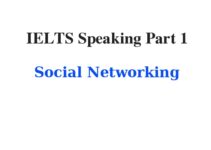Table of Contents
Topic Visit Relatives

SAMPLE ANSWERS
1. (Do you often visit your relatives?)
(Answer) Yes, I do.
(Give a reason for your answer) I like many of my relatives who are very compassionate, lovely and friendly to me and among them I would pick my younger uncle as the best relative in terms of our mutual understanding, closeness and communications.
2. (What do you do when visiting relatives?)
(Answer) There are a lot of activities.
(Give a reason for your answer) We often discuss our family issues, our thoughts on politics, religion, books writers, movies, music and on many other issues. In our big family, we share our books and recommend books to each other. Generally, adults also share heartfelt words to youngsters and advise them on how to behave decently.
3. (When was the last time you visited a relative?)
(Answer) Well, it was just last week when I visited my uncle’s family and my grandparents, who reside with him in the countryside. We went for a short walk near the field after breakfast to relax in nature and soak up some much-needed Vitamin D, which is necessary for elderly people.
4. (Why do people visit relatives?)
(Answer) For many reasons, I believe.
(Give a reason for your answer) Simply hanging out with family that you don’t see all the time is great. You get a chance to catch up with everyone and figure out what they’re doing with their lives. You also get to laugh and just be weird because they don’t judge you for your weirdness. Above all, the memories are the best when you’re with your family sitting around and reminiscing about things that you’ve done together.
Vocabulary

1.compassionate [adj]: showing compassion.
Eg: The public’ s response to the crisis appeal was generous and compassionate.
2. closeness [n]: the quality of knowing someone very well, liking them a lot, and wanting to spend a lot of time together.
Eg: A special closeness is supposed to exist between twins.
3. politics [n]: the activities of the government, members of law-making organizations, or people who try to influence the way a country is governed.
Eg: After 30 years in politics, our local member of parliament is retiring next year.
4. heartfelt [adj]: strongly felt and sincere.
Eg: Please accept my heartfelt apologies/thanks.
5. decently [adv]: in a way that is socially acceptable or good.
Eg: She admitted that she hadn’t always behaved decently.
6. reside [v]: to live, have your home, or stay in a place.
Eg: The family now resides in southern France.
7. soak up [v]: to enjoy the effects or experience of something as much as possible.
Eg: I love to lie on the beach and soak up the sun.
8. necessary [adj]: needed in order to do something.
Eg: The police are prepared to use force, if necessary.
9. weirdness [n]: the quality of being strange and unusual.
Eg: It’s a comedy which often succeeds in capturing the weirdness of real life.
10. reminisce [v]: to talk or write about past experiences that you remember with pleasure.
Eg: Grandpa likes to reminisce about his years in the navy.


